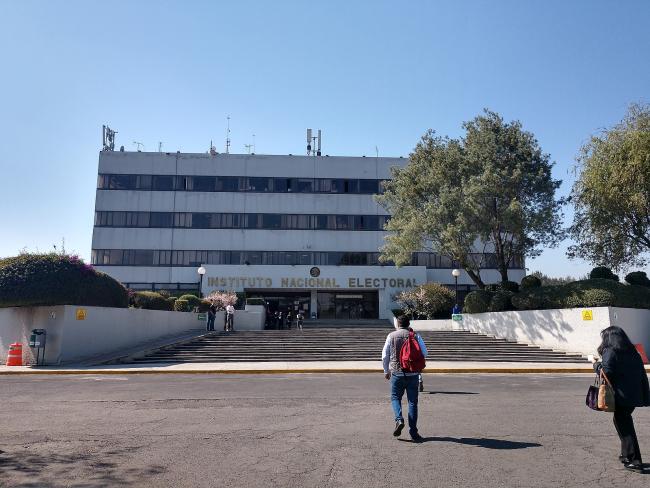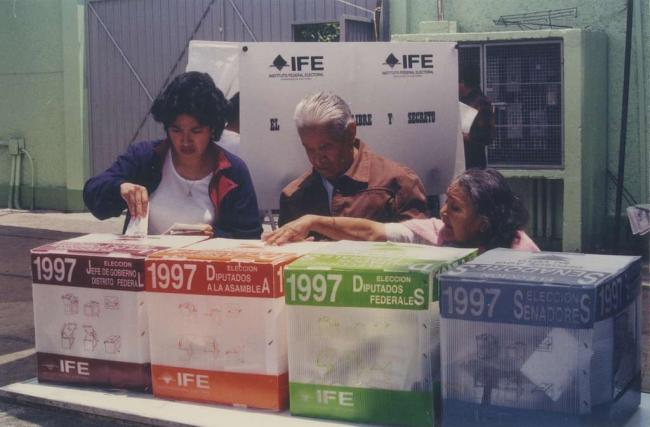
This article was originally published in Spanish by Revista Común.
Translated by Liza Schmidt.
The long fight for democracy in Mexico has been filled with contradictions. The debate around the AMLO’s reforms to the National Electoral Institute are no exception.
When President Andrés Manuel López Obrador first proposed reforms to Mexico’s National Electoral Institute (INE) in November 2022, tens of thousands protested in dozens of cities around the country. On February 22, the Senate approved reforms that will reduce sanctions for candidates who don’t report campaign spending and decrease funding for local elections offices, INE salaries, and training volunteer poll workers. AMLO has long criticized the organization, calling it corrupt, inefficient, and a tool of the elite. Critics say that these measures could lead to overspending on campaigns and miscounted votes, making the institution less independent, undermining democracy, and giving President AMLO’s party an electoral advantage in next year’s elections. But others say such claims are overblownthat although the reforms aren’t perfect, INE is indeed guilty of excesses and has historically failed to foster a robust democracy.
Although Mexico’s electoral institute was originally created as part of struggles for democracy, it has now become, paradoxically, a center of support and mobilization for the neoliberal bloc. Curiously, calls by the institute’s first president Lorenzo Córdova (2014-2023) and electoral counselor Ciro Murayama (2014-2023) to “defend the INE” have been answered not by those propelling the fight for democracy, but instead by the most entrenched supporters of the neoliberal bloc: the Partido Revolucionario Institucional (PRI), the National Action Party (PAN), the corporate media, and big business owners like Claudio X. González Laporte, longtime president of Kimberly-Clark México.
This raises key questions: Why is the neoliberal bloc the main support base for the current electoral institute? Why these actors and not others? And why is the defense of INE today being waged by the Right and not the Left, the heir of the struggles for democracy of the late 20th and early 21st centuries? The answer lies in the fact that the INE went from being the product of democratizing struggles to becoming a guardian of the neoliberal Mexican state.
The INE’s precursor, the Federal Electoral Institute (IFE), emerged in 1990 out of the fight for political democratization against the national-developmentalist state, led at the time by the PRI. The popular democratizing struggles that led to IFE’s creation began in 1968 with the student movement, which called for the democratization of the political regime. After the 1968 Tlatelolco massacre, the movement split into multiple organizations that pushed for democratization on many fronts, including in labor, urban, and campesino movements. In the face of ongoing repression, some of these organizations even turned to armed struggle and faced the state’s dirty war for the majority of the 1970s.
Since then, a democratizing project has been outlined and sustained by left parties like the Mexican Communist Party (later the Unified Socialist Party of Mexico), the Mexican Workers’ Party, the Patriotic Revolution Party, the Popular Socialist Party, the Revolutionary Workers’ Party, and others.
At the same time, big business began getting involved in politics, demanding the creation of limits to the national-developmentalist authoritarian state and greater openness to corporate demands with the goal of gaining political ground and the ability to lobby for policies. This political activism led big business to join forces around the PAN.
In the early 1980s, as the global economic crisis hit Mexico and the Mexican government turned towards neoliberalism under President Miguel De la Madrid (1982-1988), a nationalist faction of the PRI led by Cuauhtémoc Cárdenas, Ifigenia Martínez, and Porfirio Muñoz Ledo rebelled against the new hegemonic trend in the party. Allying with Left organizations and parties, they created the National Democratic Front (FDN) with the goal of making democratic changes to the political system and walking back state neoliberalization. In 1988, elections that were widely considered to be fraudulent demolished these hopes and imposed the continuation of neoliberal politics with the de facto presidency of the PRI’s Carlos Salinas de Gortari.
In response, both the parties of the left and the party of corporate lobbying briefly and partially converged in protest, demanding democratic openness. This alignment across usually conflicting opinions forced the Salinas government to yield to the pressure, leading to the creation of the IFE in 1990.
For some years, to prevent the PRI-led state controlling the organization, the IFE’s Citizen Council included a wide range of intellectuals and prominent figures representing right-wing business interests and left-wing organizations. However, over the years, this equilibrium was disrupted for two reasons. First, big business and the PAN established an alliance with the PRI to consolidate and expand the neoliberal state. Second, the IFE became increasingly technocratic, deepening the neoliberal ideology that had developed in social and political science programs in universities around the world.
When Salinas formally consolidated the neoliberal state in Mexico through widespread privatization, approving the North American Free Trade Agreement (NAFTA) and making huge concessions to transnational and financial big business, the Mexican bourgeoisie and the PAN allied with Salinas. Evidence of this alliance could be seen in the Chamber of Deputies, where the leader of the PAN bloc, Diego Fernández Cevallos, offered unconditional support to Salinas. Big business associations also took supportive positions, including the Business Coordinating Council (CCE) and the Council of Mexican Businessmen (CMHN), whose president, Claudio X. González Laporte, became part of Salinas’s advisory council.
Meanwhile, in the 1990s, a huge ideological earthquake shook the world. With the fall of the Berlin Wall and the collapse of the Soviet Union, it seemed like the era of great utopias and the fight between socialist and capitalist forces had come to an end. Capitalist hegemony established itself as the only political, economic, and cultural option around the world.
The free market doctrinewhich later became known as neoliberalismbecame the dominant ideological position, taking over schools of economics, finance, business, and administration, but also appearing in schools of social and political science. The fundamentalist idea that capitalist free market democracy is the only possible and true democracy took hold, with the democratic model of the United States as the unrivaled archetype. The United States pushed this idea tirelessly, financing grants, colloquia, symposia, postgraduate degrees, and projects that promoted the ideological project of neoliberal capitalist globalization as a quasi-scientific truth. Thus emerged the neoliberal conception of democracy, whose central tenet is electoral competition between political parties to access state power.

Neoliberal democracy brought free market economic theories into politics by conceiving of political parties as companies that should compete in a framework of absolute freedom to earn votes, as if voters were consumers. It worked like this: the citizens/consumers could acquire a political product, or candidate, through voting/money. This product was offered by parties/companies in a free competition environment. This arrangement reproduced concepts like buying and selling, supply and demand, and free competition in the political sphere, ignoring the problem of economic inequality created by capitalism, failing to propose an alternative for popular direct intervention in decision making, and refusing to disrupt the oligarchic organization of the neoliberal state. For this reason, the neoliberal idea of democracy was narrow, focused on electoral competition and rules, without any concern for social inequality.
When José Woldenberg became president of the IFE’s General Council, he applied a neoliberal democratic approach to running the institution. Disguised as an effort to increase citizen participation, the organization grew increasingly technocratic, where access to leadership roles required the highest credentials and postgraduate degrees from the most prestigious universities in Mexico, the United States, and Europe, the very birthplaces of neoliberal democracy. As in any technocratizing process, the guiding principle for selecting decision makers was technical expertise, which supposedly ensures that decisions are made without any political influence. Thus, presidents of the electoral institute boasted degrees from universities like the Universidad Anáhuac, El Colegio de México, University of Turin, Instituto Tecnológico Autónomo de México, Universidad Nacional Autónoma de México, or Columbia University.
When PAN candidate Vicente Fox won the 2000 presidential election after 71 years of PRI rule, Woldenberg promised that Mexico would achieve “the transition to democracy.” But in the 2006 presidential elections, there was fraud. Under the leadership of Luis Carlos Ugalde, the IFE played a crucial role in favoring the neoliberal bloc: it declared Felipe Calderón the winner, refused to carry out a complete recount, hired PRI-aligned mapaches electorales (Mexican slang for architects of electoral fraud), minimized thousands of inconsistencies in the vote count, and dismissed data-based studies by the Universidad Nacional Autónoma de México that showed anomalies as soon as the official vote count began.
In the 2012 presidential elections, the IFE turned a blind eye to massive vote buying by the PRI which, together with the private bank Monex and supermarket retailer Soriana, distributed prepaid gift cards as a means to win the presidency. This time, the IFE did not defend their own tenets of multiparty free competition.
Despite being the product of democratizing struggles at the end of the 20th century, the IFE’s turn towards technocracy and the general consolidation of neoliberal democracy sparked a silent radical reconfiguration of the electoral institute, converting it into a guardian of the neoliberal Mexican state, as clearly seen in the 2006 and 2012 elections.
In 2014, thanks to the neoliberal “Pact for Mexico” agreement between the PAN, PRI, and PRD (recently incorporated into the neoliberal bloc), the IFE was restructured as the National Electoral Institute (INE). The Pact for Mexico elected as INE president Lorenzo Córdova, who to this day has refused to reduce his disgraceful salary, has made racist comments against Indigenous people, and has undertaken a fierce fight to defend the INE as a defender of the neoliberal state. It is no coincidence that the INE’s main defense comes from the PRIANRD coalitiona combination of PRI, PAN, and PRDand the neoliberal bloc: these are the same actors that elected Córdova and so it is natural that they would defend their creation.
The current conflict is ultimately between two distinct concepts of democracy: the neoliberal view that refuses to accept change under the slogan “don’t touch the INE” and the view that seeks to curb the extravagant spending of public resources and proposes that the organization be financially restructured.

